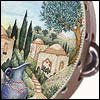What’s your favorite drink? Is it soda? Fruit or vegetable juice? Freshly brewed coffee? Or perhaps expensive, aged wine?
What do you drink when you are extremely hot and thirsty and you need to satisfy your unquenchable thirst? While wine may be tasty, and while you may need your morning rush of caffeine, when you really need to quench a thirst, rely on water.
With the death of the righteous Miriam, the miraculous well that had sustained the Jewish people in her merit also departed.
And Miriam died there... And there was no water for the congregation (Numbers 20:1-2)
Three great providers arose for the people of Israel—Moses, Aaron, and Miriam—through whom they received three great gifts: the well, the clouds of glory, and the manna. The well was in the merit of Miriam, the clouds in the merit of Aaron, and the manna in the merit of Moses.
When Miriam died, the well was removed, as it says, "And Miriam died there..." and, immediately afterward, "And there was no water for the congregation." The well then reappeared in the merit of the other two. (Taanit 9a)
Miriam's association with the thirst-quenching waters of the well that she bequeathed to her people can perhaps be understood by exploring the spiritual significance of water.
Water is tasteless, scentless, and colorless. But it is also the basic requisite of life. On a spiritual level, water represents the unadorned yet fundamental and crucial kabbalat ol—our simple acceptance of G‑d's will and the yoke of Heaven.
Water is unlike any other liquid.
Chassidic teachings describe two modes of Divine service, comparable to two liquids: "water" and "wine." Wine is pleasing to the eye, nose, and palate, intoxicating and exhilarating. On a spiritual level, wine represents the gratifying aspect of our divine service—the joy, fulfillment, depth of understanding, and meaning that we experience in our relationship with G‑d.
Yet while wine can be so pleasing, to a thirsty individual, a gulp of water is tastier than the most delectable wine.
In a spiritual sense, when we recognize how much our soul thirsts for G‑d, simply performing His will for no reason other than it is His will is the most gratifying experience. When we are not motivated by our personal sense of spiritual fulfillment, nor our intellectual enjoyment, but simply because we want to be attached to something greater than ourselves—we have revealed our absolute connection and bond with G‑d.
Miriam demonstrated this absolute negation of reason in order to perform G‑d's will from the youngest age, even while in the bitter Egyptian exile. Her heroism came to light as a youngster when she defied Pharaoh's decree of killing the newborn boys. She and her mother risked their lives because they "feared G‑d and did not act as the King of Egypt commanded them." (Ex. 1:8)
The Midrash explains that Miriam courageously confronted her father who had separated from her mother as a result of Pharaoh's wicked decree. She convinced him that he must follow G‑d's command unquestioningly, including the precept of "be fruitful and multiply." (Gen. 9:1)
The basis of her argument was that, even if it didn't make sense, we must do G‑d's will because it is His will, irrespective of logic or consequences. Miriam's father recognized the truth and sincerity of his young daughter's words, and the result of her actions was ultimately the birth of Moses.
Within the deep bitterness of the Egyptian exile, Miriam intuitively understood the simple truth—that our relationship with G‑d is not dependent on our circumstances, personal likes, or logical comprehension.
The message of Miriam's life, as reflected in the miraculous well of water that was provided for the nation in her merit, was that we are not in this relationship with G‑d only during the good times, when we hope for personal gain, growth or gratification.
Our relationship with G‑d is one that must even surface in the depths of the Egyptian exile, in the depths of our personal darkness and incomprehension. Because as basic and crucial as water is for our survival, this, too, is a relationship that touches the very essence of our being.








Join the Discussion